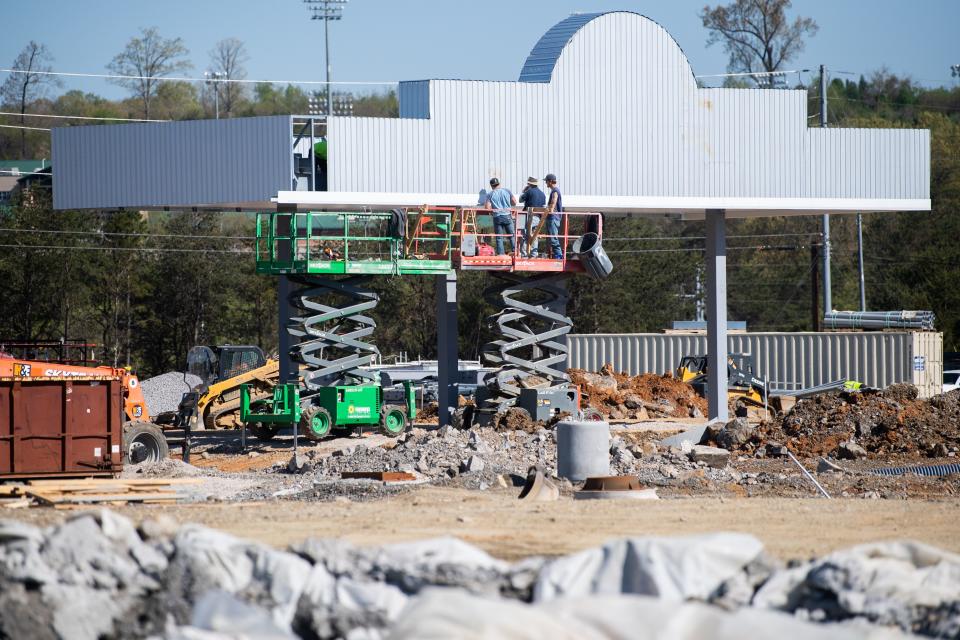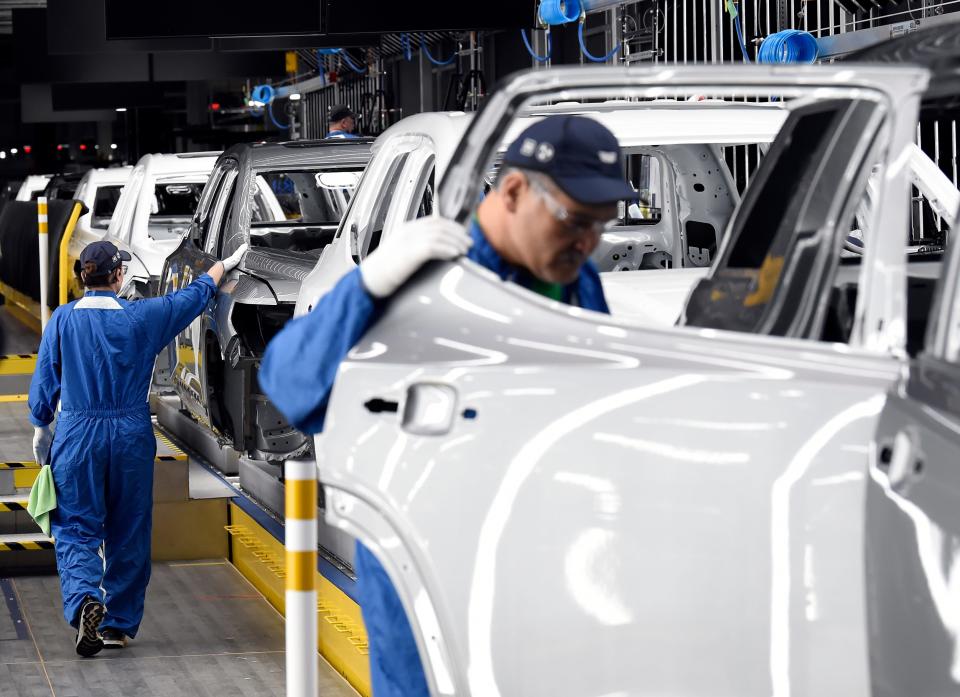600 miles on a single charge? How Tennessee could shape the future of electric vehicles
Electric vehicles, now the choice for the environmentally minded, could be become the standard for everyone if Tennessee succeeds in an ambitious goal to engineer fast-charging alternatives to fossil fuel-burning vehicles that spew 27% of America’s greenhouse gases.
The University of Tennessee at Knoxville is at the helm of a statewide coalition leveraging expertise in the public and private sectors to create lighter, safer, more efficient EVs – and supporting infrastructure – that can compete with gasoline-powered motor vehicles.
At stake for the coalition is up to $160 million of federal funding in 2025 to execute its plan, and for the rest of us a reliable transportation alternative that reduces harm to the environment.
"I think part of the roadmap is already moving with us because we have a great manufacturing base," Kevin Heaslip, director of UT’s Center for Transportation Research, told Knox News. "What's at stake is the ability for Tennessee to have a dynamic economy that takes advantage of the investments the state has already made in the automotive (industry)."
UT will lead electric vehicle research coalition
The new coalition, Advancing Technology-Enabled Mobility Solutions, is funded by a $1 million grant from the National Science Foundation's Regional Innovation Engines program.
Heaslip said roughly 50 awards were given in this round. But for the big bucks − $160 million per coalition − only between five and 12 plans will be selected.
The UT coalition includes public and private universities in every part of the state, major research centers such as Oak Ridge National Laboratory and the Tennessee Valley Authority, state and local governments, industry leaders such as FedEx, Pilot and Denso Manufacturing Tennessee, and organized labor groups.
Already, the Tennessee coalition has identified some key areas of research, including advancing computing power and improving sensors and analytics for EVs, as well as improving battery efficiency and life and building out the network of recharging stations.
What does the future of electric vehicles look like?
Imagine a world where charging stations are alongside gas pumps and where electric vehicles could travel from Knoxville to New York City without stopping.
Technology is trending this way, Heaslip said, and the roadmap will be based on the needs of the state − what the coalition calls, "use-inspired research."
Lighter electric vehicles, longer trips
It makes sense: If you can make a vehicle lighter, you don't need as large of a battery. And if the battery is smaller, the vehicle is even lighter.
A lot of EVs are considered high-price vehicles, and much of those prices have to do with battery costs.
"The battery costs are going down," Heaslip said. "We are hoping to drive the battery cost down even further."
Electric vehicle prototypes that can travel between 600 and 1,000 miles per charge already exist, he said, though they are not quite ready for consumers.
The coalition aims to solve that challenge.
Charging electric vehicles smarter, not harder
The speed of charging will be a key area of research for the coalition − making the experience more like refilling a gasoline-powered car rather than waiting for your phone to charge.
"If you go out to Crossville, Buc-ee's has gas pumps, but they also have Tesla charging stations as well," Heaslip said. "Especially along the interstates, you're starting to see them at more truck stops. ... We're starting to see the infrastructure built out."

The Buc-ee's opening soon in Sevierville plans to have 22 EV charging stations.
But while you can't fill up a car with gas at home, you can charge one− and that's still where most charging happens, Heaslip said.
This might mean public charging ports aren't as vital as a strong connection at home. The research will tell.
Why would Tennessee make for a good EV hub?
History has a lot to do with it.
"I think the legacy of the Tennessee Valley Authority is a great backdrop to our state being a leader in electric vehicles," Heaslip said. "We were a leader in electrifying the country in the '30s and '40s. ... It's a natural next step to start thinking about how Tennessee leads in the electrification of vehicles."

Series production of Volkswagen's first U.S.-assembled EV, the electric ID.4, started at its Chattanooga plant during the summer of 2022. Nissan's vehicle assembly plant in Smyrna and its powertrain plant in Decherd have both been operational for decades.
Transportation equipment accounts for 12% of Tennessee's total exports, according to the state's economic development department, and 3% of all cars, light trucks and SUVs made in the United States came from Tennessee in 2021.
Heaslip imagines a future where manufacturing, research and development are "co-located" in Tennessee.
Could more electric vehicle jobs and careers be coming?
Just because electric vehicles are powered by modern technology doesn't mean industry jobs require a specialized degree.
Manufacturing and maintenance are required whether vehicles run on gasoline or batteries.
"If you think of doing maintenance on an electric vehicle ... it's quite a bit cleaner actually" Heaslip said. "You could do something that is a good, blue-collar job, but it also provides the opportunity to do something a little more technologically advanced, as well."
The coalition thinks it's important for the workforce powering the EV industry in Tennessee is made up of Tennesseans.
As research moves forward, the coalition will focus on workforce development plans that start with K-12 opportunities.
Ryan Wilusz is a downtown growth and development reporter. Phone 865-317-5138. Email ryan.wilusz@knoxnews.com. Instagram @knoxscruff.
Support strong local journalism by subscribing at knoxnews.com/subscribe
Tennessean reporter Melonee Hurt contributed to this report.
This article originally appeared on Knoxville News Sentinel: Tennessee leading electric vehicle charging research with career paths

